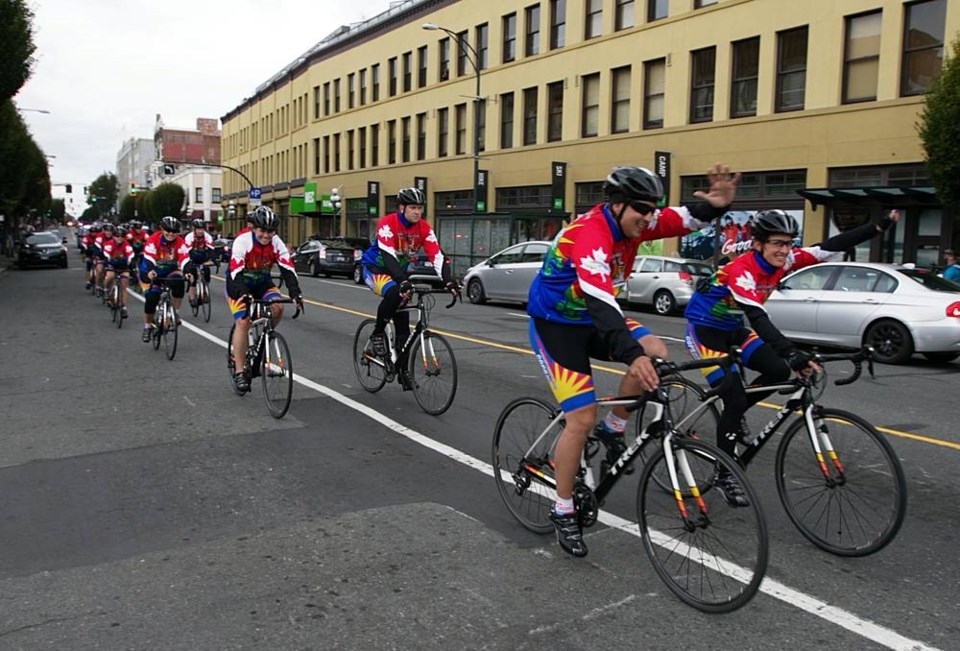Everything about this year’s Tour de Rock has changed because of the pandemic. A team of cyclists won’t ride the entire length of Vancouver Island, popping into crowded school auditoriums or attending shoulder-to-shoulder community centre fundraising dinners with the goal of raising more than $1 million for pediatric cancer research.
Even the mascot Ryder the Raccoon will take a hiatus this year.
But what hasn’t changed is the Canadian Cancer Society’s goal of making life better for children with cancer and their families, said Tiffany McFadyen, the society’s Tour de Rock co-ordinator. If anything, COVID-19 has made life more stressful for such children, who are kept in an extremely tight bubble due to compromised immune systems.
“Cancer doesn’t take a backseat when a pandemic hits,” she said. “These families are still going for treatment, they’re still travelling back and forth to the hospital. They have even more anxiety than they’ve had in the past. It’s always a world pandemic in their world because they’re trying to keep their kids away from germs and sanitize, because for them it’s life and death.”
Typically the Tour de Rock consists of a 24-member team of police officers, military members, firefighters, paramedics and media who ride 1,100 kilometres from the northern tip of Vancouver Island to Victoria over two weeks.
After B.C. declared a public-health emergency on March 17, the Tour de Rock planning committee realized it wouldn’t be possible to train 24 new riders and host events all over the Island. For months, McFadyen said, it was unclear if there was any way for the Tour to go ahead.
This year, its 23rd, 48 alumni riders from across Vancouver Island will ride to and from “hub” events in their local communities over 10 days. For example, on the first day of the Tour, Sept. 23, four riders will cycle into communities across the North Island. Over the following nine days, different groups of between six and 10 riders will ride into communities across the Island until the final group rides around Victoria on Oct. 2. All of the riders will be screened for symptoms and have their temperatures checked in the morning before they ride.
“Everything about Tour this year is 100 per cent different,” McFadyen said. “It’s just been a challenge because we’ve done it the same for the last 23 years.”
Community members can attend the hub events to purchase Canadian Cancer Society merchandise and make a donation while keeping physically distant. The locations of the hub events are still being finalized, McFadyen said.
The mascot Ryder the Raccoon won’t make an appearance until the final day, because the logistics were too complicated given that two different people wear the costume, McFadyen said.
Nationwide, the Canadian Cancer Society is bracing for a decline of about $80 million in donations this year, said Andrea Seale, the organization’s CEO. The society has temporarily laid off a third of its 900 employees as a result.
Popular fundraisers such as October’s Run for the Cure are going virtual this year, which is expected to result in a dramatic drop in donations. The virtual Relay for Life raised $4.4 million compared to about $20 million last year.
“We’re 82 years old and I think this is the greatest challenge we’ve ever faced,” Seale said. “The need for support is as great as it has ever been.”
Money raised from the Tour de Rock also funds Camp Goodtimes, a camp program in Maple Ridge for kids with cancer and their families. This summer, the camp went virtual, with craft materials mailed out in advance so kids could follow along. McFadyen said that meant some kids who would have been too sick to attend because of cancer treatments were able to participate.
The Tour de Rock’s fundraising goal this year is $600,000, half of what it typically brings in each year through a combination of community fundraisers all over the Island, school donation drives, corporate sponsors and money raised by riders. The Tour de Rock has raised $26 million to support pediatric cancer research and families over the past 22 years.
“We’re not naive to the fact that all of our [fundraising] events have been cancelled,” McFadyen said.
“I pray that people, out of the goodness of their heart, will go online and donate.”
kderosa@timescolonist.com
Katie DeRosa is one of the alumni riders for this year’s Tour de Rock. To donate, visit tourderock.ca



